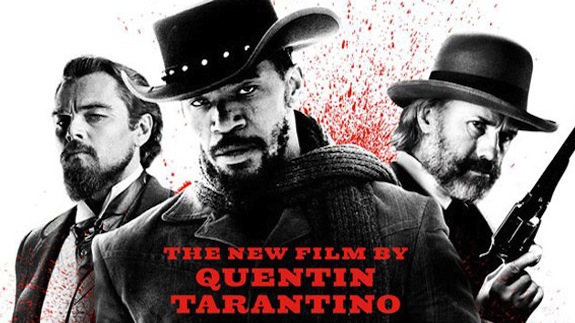
Courtesy | moviesblog.mtv.com
“Django Unchained” is the latest cinematic contribution by Quentin Tarantino, a filmmaker who knows how to have a good time and make Oscar-worthy features at the same time. Essentially an odyssey through the antebellum South, “Django” follows a slave-turned-bounty hunter of the same name (Jamie Foxx) just two years before the Civil War. Slavery is at its height in the developing Confederate states, and Django is liberated from some nasty slavers by Dr. King Schultz (Christoph Waltz), a German assassin for the U. S. government – Schultz needs Django to identify three targets he is hunting. In the process, Django becomes Schultz’s apprentice and they eventually scheme to rescue Django’s wife from despicable plantation owner Calvin Candie (Leonardo DiCaprio).
The subject matter in “Django” is touchy to say the least, and in the hands of a more conventional, less daring director it may have suffered. Let it be known that this film is a period piece in every sense of the word, and the period happens to be the peak of African slavery in 19th century America. I have never heard so many uses of the n-word in my life, yet the delivery of it is not excessive or ironic — I believe Tarantino, who also penned the script, employed this word so repetitively because it exemplified the hateful treatment of black people at the time. Only with a black protagonist and emancipator like Django could a movie like this be watchable because of the brutality with which the slaves are portrayed and treated.
Blending 1970s cinema with contemporary style
At its heart, “Django” is a super stylized spaghetti western that uses a blend of cunning, contemporary direction with the kinds of methods you’d see in hectic 1970s cinema. However, amid all of the action and truly hilarious dialogue, there are many significant layers to this story. Tarantino did this with “Inglorious Basterds” back in 2009, a movie that praised adventure while also bluntly tackling the villainy of the Nazis and their mission to exterminate the Jews. In “Django,” it’s clear that the white man is an evil entity, and the way that they relate to blacks is not simply evil but just as a man would treat to a beast. The dynamic duo of Django and Dr. Schultz is a riveting narrative anchor, a representation of both races working as brothers in the face of great racism – Calvin Candie represents just how depraved the Southern aristocracy became during the slave era.
Some may consider Tarantino’s pacing slow, but it’s so easy to get lost in the characters and their conversations that whatever “slow” points there may be, they never bore but stimulate. Often when two or more characters talk for extended periods within the Tarantino universe, the dialogue is working up to a point of revelation and all-out frenzy – blood will stain the walls as quickly as the conversation began. “Django” features some of the bloodiest violence I’ve seen in any movie, ever. It is gratuitous, but in the best sense of the word. If a man is shot, he will bleed plenty and cry out in pain — many gun battles are too clean in films that strive for realism. Tarantino’s violence isn’t necessarily glorified but expertly choreographed and extremely true to reality.
Cast adds to multi-layered story
One of the major draws of Tarantino’s pictures is his casting, and “Django” is no exception. This ensemble is enough to get any film fan to the theater — particularly DiCaprio, who has never played such a stark villain in his career. He is so ferocious as Candie, it’s hard to recall the pretty boy we once loved at the bow of the “Titanic.” Truth be told, I do love him here as Candie — he’s a baddie you love to hate, and while DiCaprio’s performance may have become turgid at times, he is ultimately one of the best slave-era antagonists in cinema history. Foxx is a no-nonsense hero here, and Waltz is unbelievably charming as the sharp-tongued, trigger-happy Dr. Schultz. “Django” is brilliant because it takes a world that we know, a dark period of our nation’s history, and introduces a dimension of satisfying vengeance. It’s Tarantino’s own twisted version of justice that you can’t help but cheer for.







